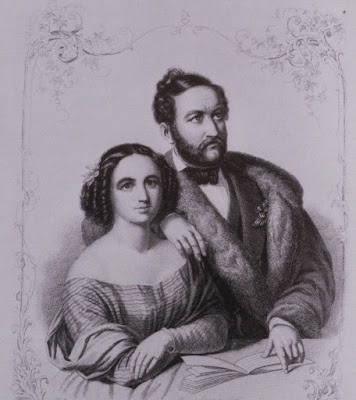Ein Sommernachtstraum - Felix Mendelssohn, Fanny Mendelssohn Hensel; Jacquelyn Wagner, Valentina Stadler, Le Cercle de l'Harmonie, Jérémie Rhorer; Philharmonie Essen
Fanny Mendelssohn Hensel & Wilhelm Hensel
An imaginative evening combining music by Felix and Fanny with the texts that inspired them, along with the magical timbres and textures of the period instruments.
Beginning our journey to Berlin and Hannover with a stop over in Essen to visit the Folkwang Museum, we happened upon an imaginative concert given at the Philharmonie Essen on Sunday 21 May 2023 by Jérémie Rhorer and Le Cercle de l'Harmonie. The centrepiece of the concert was Mendelssohn's overture and incidental music to A Midsummer Night's Dream (Ein Sommernachtstraum). Rhorer and Le Cercle de l'Harmonie were joined by soprano Jacquelyn Wagner, mezzo-soprano Valentina Stadler, members of the Aalto Kinderchores and the Women's Choir of the Philharmonic Choir, Essen, plus actor Wolfram Koch. The remainder of the programme focussed on the idea of music and telling tales, with Fanny Mendelssohn Hensel's Szene aus 'Faust II' from 1843, and her Hero und Leander from 1831.
For A Midsummer Night's Dream Wolfram Koch gave us not a plot summary but speeches from the play, whilst before each of the works in the first half we heard extracts from the works by classic German authors that inspired the music, Grillparzer, Goethe and Schiller. The result was to place the siblings' musical inspiration rather more firmly in a literary context than usual.
We began with an extract from Franz Grillparzer's Melusina (from 1822-23), originally written as a libretto for Beethoven, and finally set by Conradin Kreutzer in 1833. This was followed by Felix Mendelssohn's overture The tale of the Fair Melusine (written in 1833 after hearing Kreutzer's opera). This began with the wind and we noticed the wonderful combination of timbres and textures, and even when the strings came in, they did not dominate. Throughout, I very much enjoyed the meaty sound of the period clarinets. The overture mixed the gently flowing with sections of Mendelssohnian drama, full of excitement and attack. A lovely start to the evening.
Then Koch gave us a speech from Goethe's second part of Faust, the part far less well-known in English-speaking countries. Fanny Mendelssohn Hensel's Szene aus 'Faust II' was written in 1843 for soprano solo, women's choir and piano, setting the opening stanzas of Goethe's Act I. She realised the work needed orchestrating but never did so, and we heard it in contemporary composer Reinhard Fehling. Whether deliberately or not, in this piece both composer and orchestrator seem to have been channelling Mendelssohn's Ein Sommernachtstraum (the incidental music written in 1842 and premiered in 1843, so it was certainly current for Fanny).
The cantata is a sequence of solos (sung by Jacquelyn Wagner) and choruses. The opening solo with chorus was lyrical and serious yet with clear fairy elements too. Recitative brought a moment of drama followed by a fairy chorus with an elaborate violin solo (played by leader, Jonathan Stone). One movement used a solo choral group with light, pizzicato accompaniment, to delightful effect. Wagner's final solo brought and element of dark drama to the work. It made a fitting companion to her brother's incidental music and you wondered why her delightful cantata was not more often performed.
We then moved onto Schiller, his ballade Hero und Leander followed by Fanny Mendelssohn Hensel's dramatic scene for soprano (Jacquelyn Wagner) and orchestra. Dating from 1832 and setting her husband Wilhelm Hensel's text after Schiller. The music took us away from Felix and brought out hints of Weber's operas, in particular 'Ocean, though mighty monster' from Oberon (premiered in 1826).
Here, sung by Wagner with a lovely focussed, bright tone and nice combination of strength and flexibility, including the bravura moments where Fanny Mendelssohn Hensel seemed to be most distant from her brother. The whole developed an urgent intensity, gradually building from the calm seas of the opening to Hero's final cry of 'I come' as she leaps to join Leander in death.
For Felix Mendelssohn's Ein Sommernachtstraum the composer set August Wilhelm von Schlegel's text after Shakespeare. Wolfram Koch gave us speeches from a German translation of the play, though the translator of these was uncredited. What we noticed was how detailed Felix Mendelssohn's incidental music is. In the frequent moments of melodrama, both speaker and conductor had to pay attention to each other, this was melodrama in the classic 19th-century sense.
Koch used a score, unsurprisingly, and gave us speeches by Oberon, Titania, Puck (Droll) and Theseus; no lovers, no mechanicals, but that reflects Felix Mendelssohn's approach. At the 1843 performance in Potsdam, for which the music was written, Act One was given without music, followed by the Nocturne. Koch's performance was something of a tour de force, and all the characters came over vividly, though it was strange hearing it in German.
There were plenty of musical felicities too, from the delicacy and excitement in the Overture to the rumbustiousness of the Scherzo. The Nocturne was particularly fine with some magical horn playing (and why would you ever play it on a modern horn, when a natural horn can bring so much colour to the musical line). The music added atmosphere to the dramatic moments with Koch. Then for the best known number, the Wedding March, Rhorer took it at quite a lick, far more characterful than the usual stately walk down the aisle. The performance was full of wonderful and magical moments, and I remain convinced that Mendelssohn's music gains a particular magic when played like this on period instruments.
I was rather taken with the Philharmonie's Konzerteinführung für Kinder, where children would spend the first half of the concert being introduced to the music in the second half, and then listen to the second half of the concert. A lovely idea.

.jpg)






%20Craig%20Fuller.jpg)


No comments:
Post a Comment